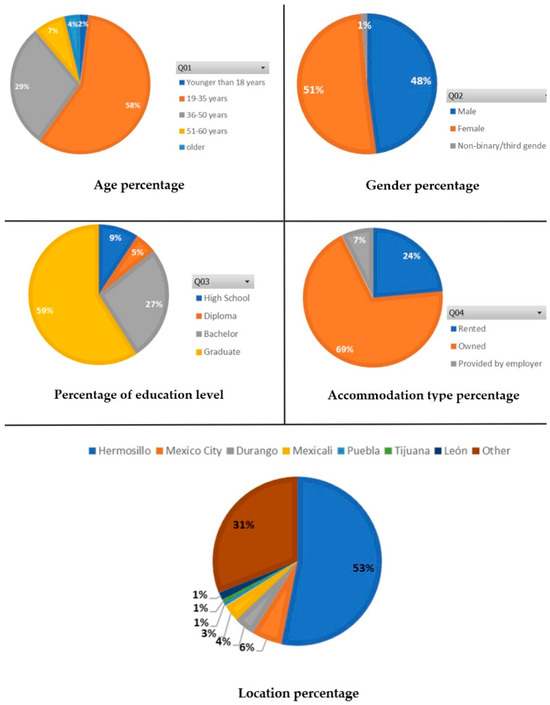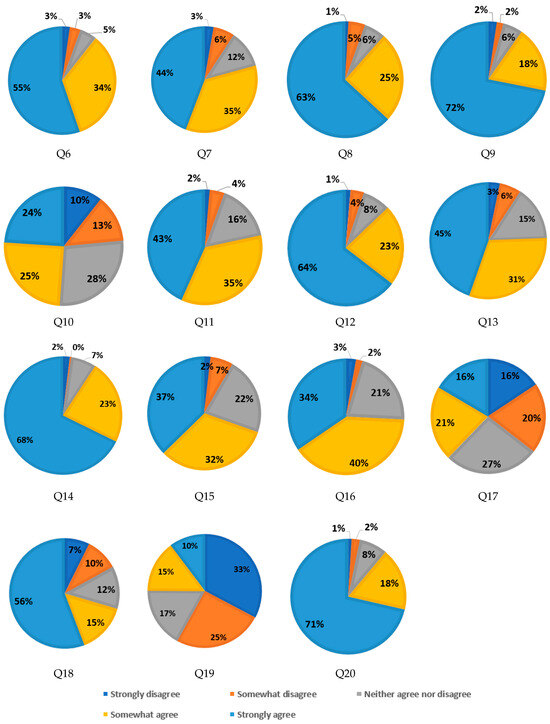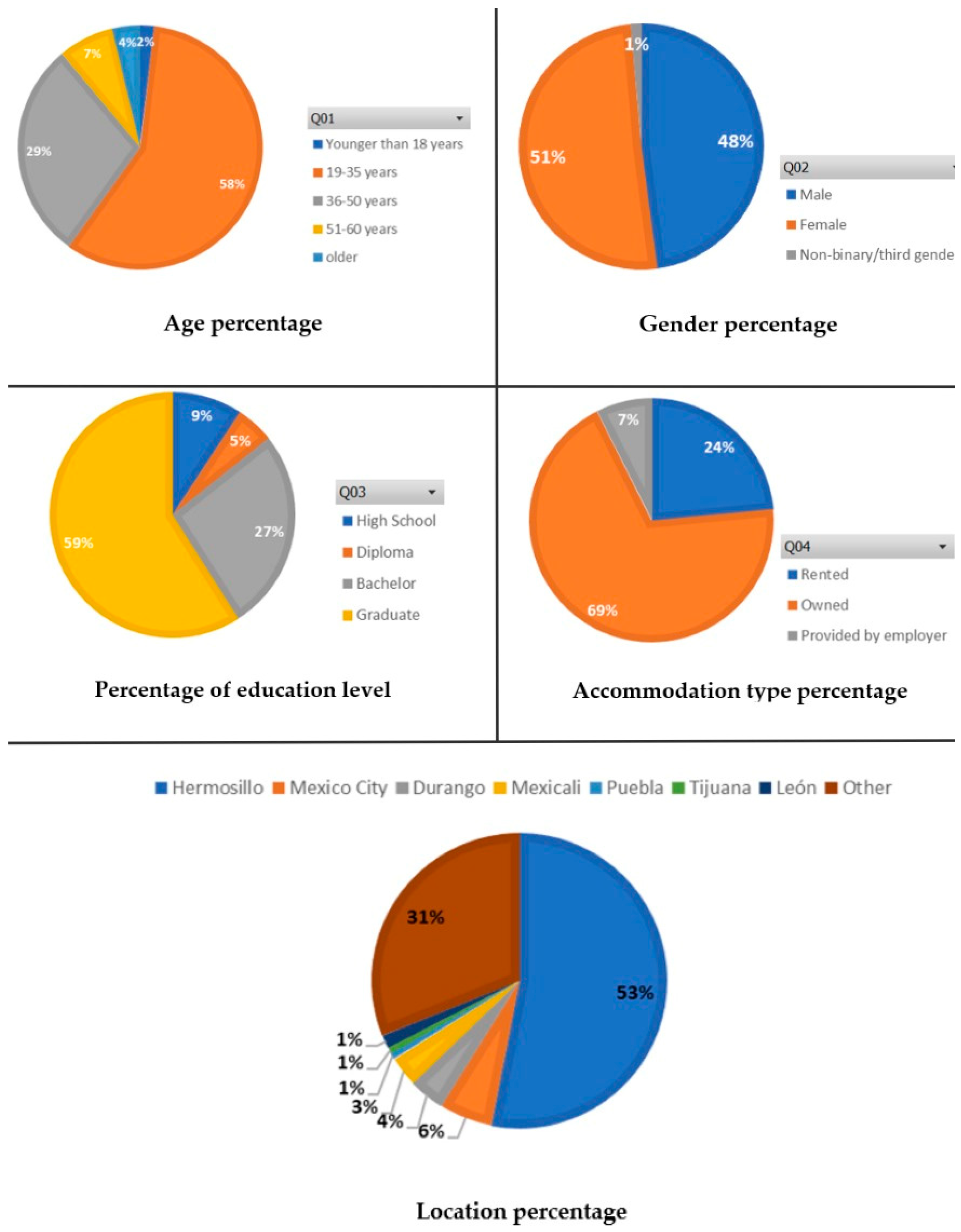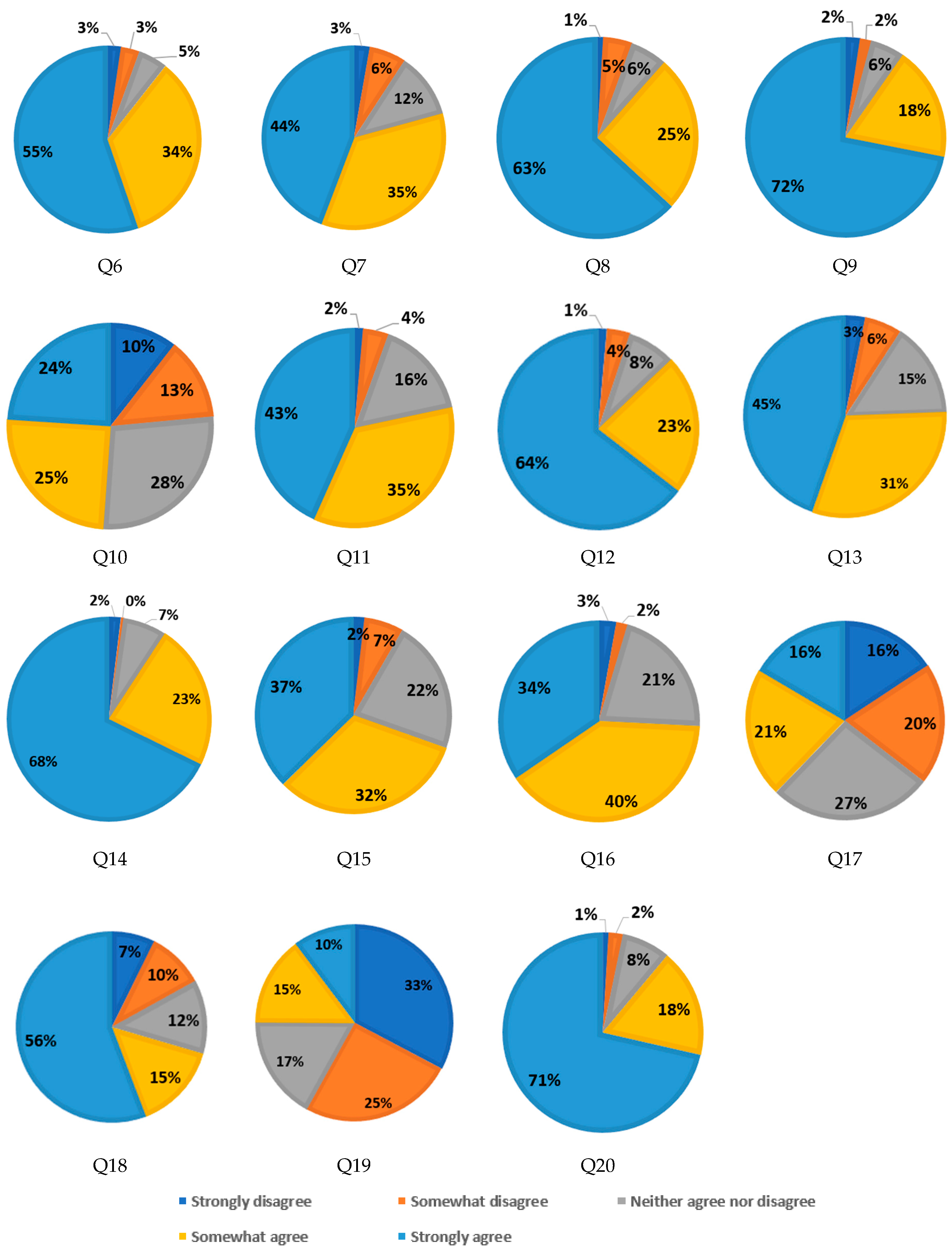Abstract
This study identifies barriers hindering solar energy projects in Mexico and explores factors influencing public acceptance. Utilizing latent variables, the research reveals a correlation between low solar energy acceptance and government disinterest. Younger age and higher education levels positively correlate with greater support for environmental conservation and solar projects. Such results emphasize the need for proactive strategies by policymakers, project developers, and other stakeholders in Mexico. Similarly, this study reveals the perception of the participants regarding government’s pivotal role in providing financial incentives and promoting solar initiatives to enhance public trust and acceptance of solar energy.
1. Introduction
Recently, solar energy projects have gained significant public attention due to a decrease in the cost of solar panels and a global drive to reduce dependence on fossil fuels and improve environmental responsibility. Despite the ubiquity of strong evidence supporting the benefits of investing in solar energy generation, the reason why the number of solar energy projects has not increased as expected, particularly in developing countries like Mexico, is unknown.
To address this void in the literature, this study surveys Mexican citizens and identifies possible principal influencing factors like public perspective, environmental awareness, economic factors, government support, and people’s perceptions. Our results shows that one crucial factor for the success of this type of renewable energy generation is public acceptance, a conclusion that is in alignment with the results of previous studies like Perlaviciute et al.’s work [1], which was conducted in developed countries.
Regardless of Mexico’s large potential for solar energy production due to its sunshine duration, there are challenges that need to be addressed in order to increase public support of this type of technology. The objective of the study is to identify the main factors influencing people’s acceptance of solar energy in Mexico in order to help those in charge of developing these projects to make the best decisions and to gain the trust of people in order to achieve the success of the projects.
2. Variable Selection
The success of solar energy projects depends on a multifaceted interaction of factors. Public perspective is paramount, and early community involvement and transparency improve project viability. Positive public perception correlates with greater acceptability, underscoring the importance of community input from the start of the project [2,3].
Education plays a crucial role, as an informed public aware of the long-term environmental and economic benefits is more likely to support solar initiatives [4]. Public awareness of the benefits associated with solar projects, along with recognition of the importance of reducing greenhouse gas emissions, is critical to the success of renewable energy efforts [5,6]. Economic considerations are integral, and people inclined to invest demonstrate greater support, highlighting the direct link between investment inclination and the economic viability of a project [7].
Government commitment significantly influences project success, and greater environmental concern correlates with increased acceptability of solar energy. Incorporating community input into decision-making processes further improves project acceptance [8]. Lastly, selecting an optimal location in areas with high solar radiation is crucial for efficient power generation, as it not only improves project performance but also increases acceptability due to higher energy efficiency and positive public perception [9] associated with the use of abundant sunlight. These factors collectively underscore the complex web of considerations necessary for the acceptance and long-term success of solar energy initiatives.
3. Data Collection
To carry out the study, a survey was applied in different cities in Mexico; the survey contained key questions used to obtain information and valuable data necessary for the research. The surveys were applied specifically in Hermosillo, Durango, Mexicali, Puebla, Tijuana, León, Mexico City, and other cities. A total of 300 surveys, considered exploratory research, were completed. Each of the questions included answers on an ordinal scale, which were converted to numerical values for data analysis.
4. Descriptive Statistics
Figure 1 provides information about the people surveyed, based on their sociodemographic data. More than half of those surveyed were between 19 and 35 years old, and almost 30% were between 36 and 50 years old, constituting the majority. The gender distribution is balanced, and approximately 60% possess a high level of graduate education. Homeownership prevails at almost 70%, while 24% rent, and 7% receive housing from employers. It should be noted that Hermosillo Sonora stands out in the pie chart (e) in Figure 1, with the highest response rate. Renowned for its abundant sunlight and high levels of radiation, the city exhibits significant potential for solar energy generation, emphasizing its promising renewable energy outlook.

Figure 1.
Pie charts showing percentages of sociodemographic data.
Figure 2 presents the pie charts of the percentages of the public’s responses to some questions that reveal important information for the study. Each color represents the type of response of the people surveyed. The strong blue color means that they strongly disagree, the orange color indicates that they somewhat disagree, the gray color means that they neither agree nor disagree, the yellow color shows that they somewhat agree, and the light blue color indicates that they strongly agree.

Figure 2.
Pie charts showing percentage of public responses.
- Q6: Installation of solar energy systems is costly, but this cost will be compensated in the future.
- Q7: Maintenance of solar energy systems is costly, but this cost will be compensated in the future.
- Q8: Solar energy is a reliable and secure source of energy.
- Q9: Solar energy generates clean energy that protects the environment by reducing greenhouse gas emissions.
- Q10: The desert climate of Mexico (such as high temperature, humidity, and dust) affects the performance of using solar energy.
- Q11: Solar energy is preferable than using national grid electricity.
- Q12: Using solar energy reduces the dependence fossil fuel.
- Q13
- Are you interested in solar energy because the price of electricity in Mexico has been increased?
- Q14:
- Are you interested in solar energy because of the environmental issues?
- Q15:
- Are you interested in solar energy because it helps in creating local jobs and investment?
- Q16:
- Are you willing to invest in the “Feed-In Tariff” (by installing solar energy systems on the roofs of your houses and/or shops) if the government enacts it?
- Q17:
- Are you willing to support the use of solar energy by paying more for electricity generation?
- Q18:
- Where you live there is enough solar energy?
- Q19:
- The government in Mexico considers the opinions and decisions of the people.
- Q20:
- Do you consider that implementing solar energy where you live is viable?
5. Discussions
From the descriptive statistics, it is possible to analyze important information, as shown in Figure 2. Pie chart Q6 represents the percentage corresponding to each response to survey question 6, which tells us that people consider that the installation of solar panels is expensive, but that it is an investment that will be compensated in the future, where 55% of people strongly agree, 34% somewhat agree, only 3% somewhat disagree, and 2% completely disagree with this statement. Pie chart Q7 indicates that 44% of people strongly agree and 35% somewhat agree that the investment of maintaining solar panels is expensive, but that it will be compensated in the future, while only 12% show no preference. Pie chart Q8 reveals that a considerable percentage, 63%, strongly agree that solar energy is reliable and safe, while 23% somewhat agree. Pie chart Q9 indicates that 72% of those surveyed think that using solar energy reduces greenhouse emissions, which means that most people are aware of these benefits. Pie chart Q10 shows that 24% of people strongly agree and 25% somewhat agree that the climate in Mexico can affect the design of solar energy, which is why it is a factor that must be considered regarding the installation and maintenance of solar panels.
Pie chart Q11 reveals that 43% of people strongly agree, and 35% somewhat agree that they prefer using solar energy over the national grid. Pie chart Q12 shows that 64% of people think that the use of solar energy reduces the use of fossil fuels, which means that they are conscious of this benefit, while 23% somewhat agree, and only 12% disagree. Pie chart Q13 indicates that most people are interested in solar energy because the cost of electricity in Mexico has increased, where 45% strongly agree, and 31% somewhat agree, while only 15% do not completely agree with this statement. Pie chart Q14 reveals that a large percentage of the public is interested in solar energy because of environmental problems, with 68% strongly agreeing and 28% somewhat agreeing. Pie chart Q15 shows that 37% strongly agree, and 32% somewhat agree that they are interested in solar energy because it will help increase local jobs and improve incomes in Mexico. Pie chart Q16 indicates that 40% strongly agree, and 34% somewhat agree to install solar panels if the government promulgates it, and only 21% do not completely agree. Pie chart Q17 shows that the percentage of the public supporting solar energy is more dispersed because people are not very willing to support solar energy if they must pay more money, where only 16% strongly agree, 21% somewhat agree, and a large percentage—63%—disagree. Pie chart Q18 indicates that most people think that Mexico has the potential for the installation of solar energy, with 71% agreeing. Pie chart Q19 reveals that 33% strongly disagree, and 25% somewhat disagree that the government takes their opinions into account, so the government may be affected in the implementation of these projects. Pie chart Q20 shows that 71% of the people surveyed totally agree that where they live is viable for the installation of solar panels.
With the information obtained, it can be concluded that people in Mexico exhibit a great acceptance and interest in solar energy, but it is important to face the different existing barriers that can prevent the development of these projects, such as economic factors, knowledge about the topic, or government situations in the country.
6. Conclusions
The application of the survey helped to obtain valuable data that will be very useful in studying people’s acceptability of solar energy in Mexico. The results of the descriptive statistics revealed that the people surveyed accept solar energy as a positive alternative. However, economic and governmental factors may become a limitation for the development of these projects. Through a study of latent variables, it will be possible to analyze the data obtained by the survey and define the factors that are affecting public trust and acceptance of solar energy in Mexico in order to help the government, engineers, and stakeholders make better decisions and design better-planned proposals to achieve project success and efficiency.
Author Contributions
Conceptualization, A.S.A.-A. and G.K.; Methodology, A.S.A.-A., G.K. and M.M.; Validation, A.S.A.-A., G.K. and M.M.; Formal analysis, A.S.A.-A. and M.M.; Investigation, A.S.A.-A. and M.M.; Resources, G.K., A.E.-N. and M.M.; Data curation, A.S.A.-A.; Writing—original draft preparation, A.S.A.-A.; Writing—review and editing, G.K., A.E.-N. and M.M.; Visualization, A.S.A.-A. and G.K.; Supervision, G.K. and A.E.-N.; Project administration, G.K. and M.M. All authors have read and agreed to the published version of the manuscript.
Funding
The authors acknowledge the financial support provided through the Mitacs Globalink Research Internship program, Canada.
Institutional Review Board Statement
Not applicable.
Informed Consent Statement
This study was performed in Mexico; thus, it followed the ethics guidelines for research laid out in the Mexican law for human trials, entitled, “Reglamento de la Ley General de Salud en Materia de Investigación para la Salud.” [10]. Given that this research is considered risk-free under Mexican law, and that no personal data (name, phone number, address, ID numbers, etc.) was required from the survey respondents, no consent form was required from the participants in the study [11].
Data Availability Statement
Data sharing is not applicable due to privacy.
Acknowledgments
The first author acknowledge Mitacs for the support during the Globalink Research Internship program.
Conflicts of Interest
The authors declare no conflicts of interest.
References
- Perlaviciute, G.; Schuitema, G.; Devine-Wright, P.; Ram, B. At the Heart of a Sustainable Energy Transition: The Public Acceptability of Energy Projects. IEEE Power Energy Mag. 2018, 16, 49–55. [Google Scholar] [CrossRef]
- Sütterlin, B.; Siegrist, M. Public Acceptance of Renewable Energy Technologies from an Abstract versus Concrete Perspective and the Positive Imagery of Solar Power. Energy Policy 2017, 106, 356–366. [Google Scholar] [CrossRef]
- Batel, S.; Rudolph, D. A Critical Approach to the Social Acceptance of Renewable Energy Infrastructures; Springer eBooks; Palgrave Macmillan: Cham, Switzerland, 2021; pp. 3–19. [Google Scholar] [CrossRef]
- Ciriminna, R.; Meneguzzo, F.; Pecoraino, M.; Pagliaro, M. Rethinking Solar Energy Education on the Dawn of the Solar Economy. Renew. Sustain. Energy Rev. 2016, 63, 13–18. [Google Scholar] [CrossRef]
- Gil, A.J.; Hansen, T. Technology Characteristics and Catching-up Policies: Solar Energy Technologies in Mexico. Energy Sustain. Dev. 2020, 56, 51–66. [Google Scholar] [CrossRef]
- Mallett, A. Social Acceptance of Renewable Energy Innovations: The Role of Technology Cooperation in Urban Mexico. Energy Policy 2007, 35, 2790–2798. [Google Scholar] [CrossRef]
- Ebers, A. On the Ground in Sunny Mexico: A Case Study of Consumer Perceptions and Willingness to Pay for Solar-Powered Devices. World Dev. Perspect. 2019, 15, 100130. [Google Scholar] [CrossRef]
- MacArthur, J. Challenging Public Engagement: Participation, Deliberation and Power in Renewable Energy Policy. J. Environ. Stud. Sci. 2015, 6, 631–640. [Google Scholar] [CrossRef]
- Where Solar Is Found—U.S. Energy Information Administration (EIA). Eia.gov. Available online: https://www.eia.gov/energyexplained/solar/where-solar-is-found.php (accessed on 12 August 2023).
- De Diputados, C.; Congreso De, D.; Unión, L. Reglamento de La Ley General de Salud En Materia de Investigacion Para La Salud Reglamento de La Ley General de Salud En Materia de Investigacion Para La Salud Nuevo Reglamento Publicado En El Diario Oficial de La Federación El 6 de Enero de 1987. Available online: https://www.diputados.gob.mx/LeyesBiblio/regley/Reg_LGS_MIS.pdf (accessed on 20 September 2023).
- Miranda-Novales, M.G.; Villasís-Keever, M.Á. El Protocolo de Investigación VIII. La Ética de La Investigación En Seres Humanos. Rev. Alerg. México 2019, 66, 115–122. [Google Scholar] [CrossRef] [PubMed]
Disclaimer/Publisher’s Note: The statements, opinions and data contained in all publications are solely those of the individual author(s) and contributor(s) and not of MDPI and/or the editor(s). MDPI and/or the editor(s) disclaim responsibility for any injury to people or property resulting from any ideas, methods, instructions or products referred to in the content. |
© 2024 by the authors. Licensee MDPI, Basel, Switzerland. This article is an open access article distributed under the terms and conditions of the Creative Commons Attribution (CC BY) license (https://creativecommons.org/licenses/by/4.0/).


